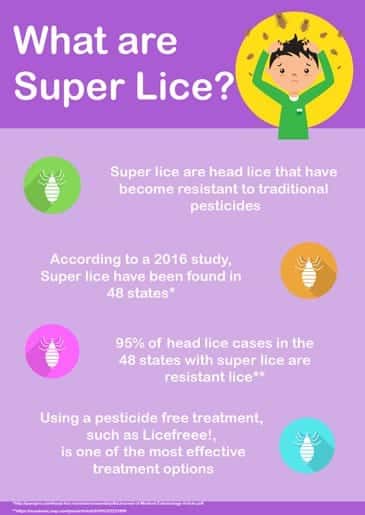What are super lice?

Unlike the name suggests, ‘super’ lice look no different from your standard head lice. Rather, what makes them ‘super’ is their resistance to traditional head lice treatments using chemical pesticides such as permethrin and pyrethrum. According to a 2016 study1, a significant number of head lice are showing resistance to treatments containing these ingredients. The resistance is likely due to permethrin and pyrethrum having been the standard in lice management over several decades, allowing lice an opportunity to build up an immunity.
How do I know if I have super lice, and how can I avoid them?
Unfortunately, unless you plan to harvest the lice from your head and send them off for genetic testing, it is almost impossible to determine if a case of head lice is ‘super’ or not. However, it is important to consider another statistic provided in the study referenced above: head lice tested in 48 of 50 states showed resistance to permethrin and pyrethrum based treatments; this would indicate the likelihood of contracting ‘super’ lice to be somewhat high. The symptoms of a head lice infestation remain the same whether they are ‘super’ or not.
We suggest following the same protocol in avoiding non-resistant lice, as we do super lice. Avoid and/or minimize head-to-head contact, do not share personal items such as combs, hats, or brushes, and pull long hair back tightly into a ponytail, braid, or bun.
What are my treatment options?
Natural & Non-Toxic Lice Treatments
There are also several natural lice treatments as well as non-toxic options to choose from; most contain various combinations of essential oils to help ‘repel’ lice, not necessarily kill them. Other treatments in this category contain Dimethicone (as mentioned above) or a similar agent, which is a lubricant to aid the comb-out process. Lastly, there are treatments that kill lice and eggs by mechanical action via dehydration such as Licefreee! non-toxic lice treatments.
Nit Picking
While time consuming and tedious, many still prefer the method of nit picking. If nit picking is the chosen route of head lice treatment, it is imperative to find a high quality (usually, metal) nit comb. The process can be long and grueling as it is recommended to comb through 1” sections of hair at a time, and the nit comb should be wiped or rinsed after each pass (to clear the comb of any lice or nits it has swept up from the hair). On most retail shelves, you can find a high quality nit comb along with products that act as a lubricant (common ingredient: dimethicone) to aid the comb-out process. If you have more than one noggin to treat, you may rethink this option.
Tips for Lice Treatment
Not all head lice treatments are created equal, and there are several that have not been proven effective against super lice. Because there is no one-size-fits-all head lice treatment, you will have to find the solution that works best for you and your family. If you are concerned about Super Lice, select a method mentioned above; if you choose a product, be sure to find one that specifically mentions ‘Super Lice’ on the packaging. Although they sound scary, super lice aren’t anything to fear. While they have become resistant to some treatments, you still have many options to tackle your head lice problems.
More questions about head lice? Check out our resources section for pictures of head lice, tips for how to get rid of lice at home, and so much more! With our help, you’ll be lice free in no time!
1Journal of Medical Entomology, Volume 53, Issue 3, 1 May 2016, Pages 653–659, https://academic.oup.com/jme/article/53/3/653/2222496 Published: 31 March 2016
